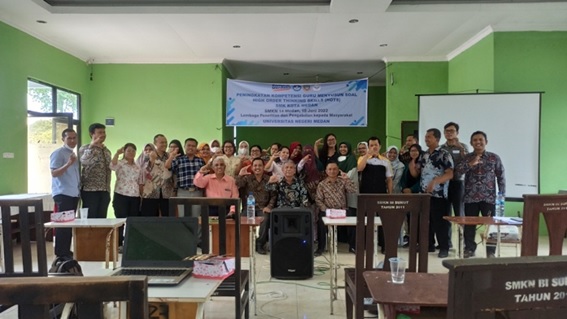Pelatihan Penyusunan Soal HOTS untuk Guru di SMK Kota Medan The Training of HOTS Questions for Teachers at Medan City Vocational School
Main Article Content
Abstract
HOTS is a fundamental skill that prospective workers must possess. Vocational High Schools, as workforce printers, must pay attention to the HOTS of prospective graduates so that they can be absorbed in the world of work. However, Vocational High Schools experience many obstacles in forming prospective HOTS graduates. One of them is the teacher's ability to prepare HOTS questions. Based on the results of initial observations, similar obstacles were also faced by SMKN 14 Medan and SMKS Al-Fattah. The purpose of this activity is to provide training on the preparation of HOTS questions to teachers in SMK. The activity method used presentation, discussion, demonstration, and assignment techniques. Activities were grouped into three stages, namely preparation, implementation, and evaluation—the results of activities run effectively by the plan. The participants participated in the activity enthusiastically. The results of the FGD showed an increase in the ability of teachers to prepare HOTS questions. The skills of preparing HOTS vocational teachers still need to be considered because HOTS is one of the key skills of prospective workers.
Downloads
Article Details

This work is licensed under a Creative Commons Attribution-ShareAlike 4.0 International License.
Authors who publish with this journal agree to the following terms:
- Any article on the copyright is retained by the author(s).
- Author grant the journal, right of first publication with the work simultaneously licensed under a Creative Commons Attribution License that allows others to share work with acknowledgment of the work authors and initial publications in this journal.
- Authors are able to enter into a separate, additional contractual arrangements for non-exclusive distribution of published articles of work (eg, post-institutional repository) or publish it in a book, with acknowledgment of its initial publication in this journal.
- Authors are permitted and encouraged to post their work online (e.g., in institutional repositories or on their websites) prior to and during the submission process, as can lead to productive exchanges, as well as earlier and greater citation of published work.
- The article and any associated published material is distributed under the Creative Commons Attribution-ShareAlike 4.0 International License
References
Ariyana, Y., Pudjiastuti, A., Bestary, R., & Zamromi, Z. (2018). Buku Pegangan Pembelajaran Keterampilan Berpikir Tingkat Tinggi Berbasis Zonasi. Jakarta: Direktorat Jenderal Guru dan Tenaga Kependidikan Kementerian Pendidikan dan Kebudayaan Republik Indonesia.
Badan Pusat Statistik Indonesia. (2021). Tingkat Pengangguran Terbuka Berdasarkan Tingkat Pendidikan. https://www.bps.go.id/id/indicator/6/1179/1/tingkat-pengangguran-terbuka-berdasarkan-tingkat-pendidikan.html
Dinni, H. N. (2018). HOTS (High Order Thinking Skills) dan Kaitannya dengan Kemampuan Literasi Matematika. PRISMA, Prosiding Seminar Nasional Matematika, 1(1), 170–176.
Hadam, S., Rahayu, N., & Ariyadi, A. N. (2017). Strategi Implementasi Revitalisasi SMK. Jakarta: Direktorat Pembinaan Sekolah Menengah Kejuruan Direktorat Jenderal Pendidikan Dasar dan Menengah Kementerian Pendidikan dan Kebudayaan.
Mangkunegara, A, A, A, P. (2001). Manajemen Sumber Daya Manusia Perusahaan. Bandung: Remaja Rosdakarya.
Nazaruddin, K., Riadi, B., Sunarti, I, Mustofa, A., & Zamzanah, S. (2021). Pendampingan membuat soal berorientasi HOTS bagi guru-guru SMK di Pringsewu. Jurnal Sumbangsih, 2(1), 112–117. https://doi.org/10.23960/jsh.v2i1.38
Septikasari, R. & Frasandy, R. N. (2018). Keterampilan 4C Abad 21 Dalam Pembelajaran Pendidikan Dasar. Tarbiyah Al-Awlad: Jurnal Kependidikan Islam Tingkat Dasar, 8(2), 107–117. https://doi.org/10.15548/alawlad.v8i2.1597
Setyaningrum, T. A., Alfiah, A., & Sulanjari, B. (2020). Kemampuan Menyusun Soal Berbasis HOTS Guru Bahasa Jawa SMK Negeri Se-Kabupaten Kendal. Piwulang: Jurnal Pendidikan Bahasa Jawa, 8(2), 155–163. https://doi.org/10.15294/piwulang.v8i2.42641
Sofyandi, H. (2008). Manajemen Sumber Daya Manusia. Yogyakarta: Graha Ilmu.
Sparrow, R., Dartanto, T., & Hartwig, R. (2020). Indonesia Under the New Normal: Challenges and the Way Ahead. Bulletin of Indonesian Economic Studies, 56(3), 269–299. https://doi.org/10.1080/00074918.2020.1854079
Wangid, M. N., Mustadi, A., Syamsudin, A., Hastuti, W. S., Perwitasari, N., Noor, A. F., et al. (2020). Pelatihan Pembelajaran dan Penilaian Berbasis HOTS Bagi Guru SD Se-Kecamatan Mantrijeron Kota Yogyakarta. PengabdianMu: Jurnal Ilmiah Pengabdian Kepada Masyarakat, 5(4), 394–403. https://doi.org/10.33084/pengabdianmu.v5i4.1197
